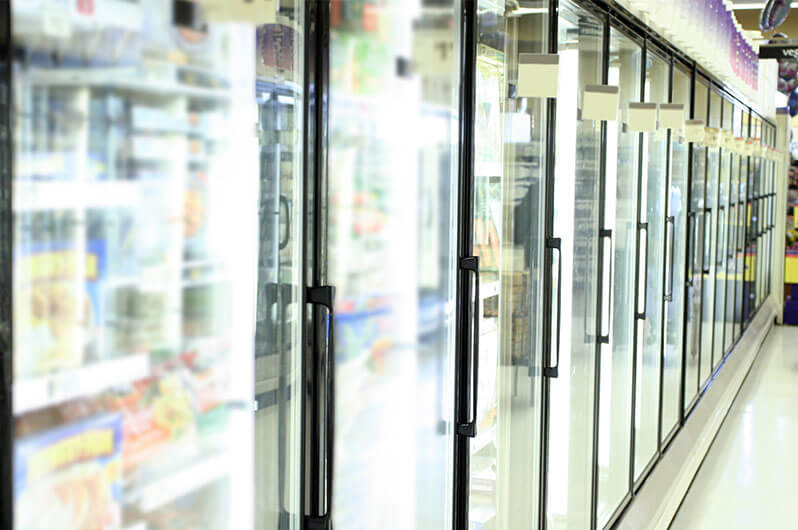Mold growth in commercial refrigeration units can pose serious health risks, compromise product quality, and lead to costly repairs. As mechanical contractors specializing in plumbing, HVAC, metal fabrication, and 3D design, we understand the importance of maintaining a clean and mold-free environment in commercial refrigeration systems.
Join us as we explore the factors that contribute to mold growth, effective removal methods, preventive measures, and the myriad benefits of seeking professional maintenance and repair services for commercial HVAC and refrigeration systems.
Read at your leisure. Feel free to call us at (218) 237-5125 if any questions arise.
Understanding Mold Growth in Commercial Refrigeration Units
Mold is a type of fungus that thrives in environments with moisture, warmth, and organic matter to feed on. Commercial refrigeration units, with their controlled temperatures and high humidity levels, can create ideal conditions for mold to flourish.
One of the primary factors contributing to mold growth within refrigeration units is moisture accumulation. These units operate in an environment where temperature and humidity are carefully controlled to preserve the quality and safety of the stored products. However, this controlled environment can sometimes work against us, creating ideal conditions for mold development.
Inside refrigeration units, especially walk-in coolers and freezers, temperature fluctuations can lead to condensation, which, when combined with high humidity levels, becomes a breeding ground for mold. This condensation often forms on walls, cooling coils, and other surfaces within the unit.
Condensation not only provides the necessary moisture for mold growth but also promotes temperature differentials within the unit, exacerbating the problem. Areas with consistent condensation, such as corners and crevices, are particularly susceptible to mold infestations.
Other factors include:
Temperature Fluctuations
Temperature fluctuations, especially in walk-in coolers or freezers, can create temperature differentials that encourage condensation, promoting mold growth.
Neglected Maintenance
Infrequent cleaning and maintenance can lead to dust, debris, and organic matter accumulating in the unit, providing a food source for mold.
Poor Ventilation
Inadequate ventilation can trap moist air inside the unit, creating a breeding ground for mold spores.
Damaged Seals
Damaged or deteriorated door seals can allow moisture and warm air to enter the unit, promoting condensation.
Refrigeration Units Prone to Mold Growth
Mold does not discriminate. Most refrigeration units will be impacted by mold if they're not cleaned and maintained properly over time. These units include:
- Walk-in coolers and freezers
- Display cases
- Reach-in refrigerators
- Blast chillers
- Ice machines
- Refrigerated trucks and trailers
- Cold storage warehouses
- Refrigerated display walk-ins
Large storage units are especially vulnerable to mold growth due to their size, temperature fluctuations, and humidity levels. Mold can thrive in corners, on cooling coils, and along insulation.
Do you have the refrigerated display cases often seen in supermarkets, convenience stores, and delis? These are prone to mold growth, too, particularly in areas where products are frequently stocked and removed. Mold can develop on shelving, glass surfaces, and around door seals.
Recognizing the types of refrigeration units prone to mold growth is the first step in implementing effective prevention and maintenance strategies. Proper cleaning, ventilation, and routine inspections are essential to keeping these units mold-free and functioning optimally.
Effective Mold Removal Methods
When mold is detected in a commercial refrigeration unit, swift and effective removal is essential. Here are some things to consider:
Safety Precautions: Ensure proper safety measures, including wearing protective gear, to avoid exposure to mold spores.
Isolate the Unit: Isolate the affected unit to prevent the spread of mold spores to other areas.
Clean with Anti-Microbial Solutions: Use anti-microbial cleaning solutions to thoroughly clean the affected surfaces, including coils, fans, and walls.
Remove Contaminated Materials: If mold has infiltrated insulation, gaskets, or other components, they may need to be removed and replaced.
Enhance Ventilation: Improve ventilation to reduce humidity and prevent future mold growth.
Regular Maintenance: Implement a routine maintenance schedule to prevent mold recurrence, including cleaning, inspection, and repair of damaged components.
Preventive Measures to Ward Off Mold Growth
Preventing mold growth in commercial refrigeration units is paramount. Here are preventive measures to consider:
Proper Installation: Ensure that refrigeration units are installed correctly, with proper insulation and seals to minimize condensation.
Regular Maintenance: Schedule routine maintenance with HVAC professionals to inspect for leaks, clean coils, and ensure seals are intact.
Humidity Control: Implement humidity control measures, such as using dehumidifiers or desiccants, to maintain optimal moisture levels.
Ventilation: Adequate ventilation, both within the unit and in the surrounding area, helps reduce humidity levels.
Seal Inspection: Regularly inspect door seals for damage and replace any deteriorated seals promptly.
Temperature Control: Maintain consistent temperatures within the refrigeration unit to minimize condensation.
The Benefits of Professional Maintenance and Repair Services
Seeking the services of commercial HVAC and refrigeration professionals offers numerous advantages beyond mold prevention. Professionals have the knowledge and experience to detect potential mold issues and address them effectively.
When you want to save money, regular maintenance can go a long way, too. Regular maintenance ensures that refrigeration units operate at peak efficiency, reducing energy consumption and lowering operating costs. In an age where every dollar matters, what's so wrong about spending a little today to save a lot in the future?
Product Quality
Maintaining a clean and mold-free environment within refrigeration units preserves the quality and freshness of stored products.
Compliance
Professionals can help ensure compliance with health and safety regulations, avoiding potential fines or closures.
Longevity
Do you want your refrigeration unit to last as long as intended? Proper maintenance and timely repairs extend the lifespan of commercial refrigeration units, protecting your investment.
Peace of Mind
Knowing that your refrigeration system is in optimal condition, thanks to professional services, provides peace of mind and minimizes unexpected downtime.
Speak with a Commercial HVAC Team Today
By partnering with commercial HVAC and refrigeration professionals, you can ensure that your refrigeration systems remain mold-free, efficient, and compliant with industry standards. Don't wait until mold becomes a costly problem; prioritize professional maintenance and reap the numerous benefits of a clean and well-maintained commercial refrigeration system.


